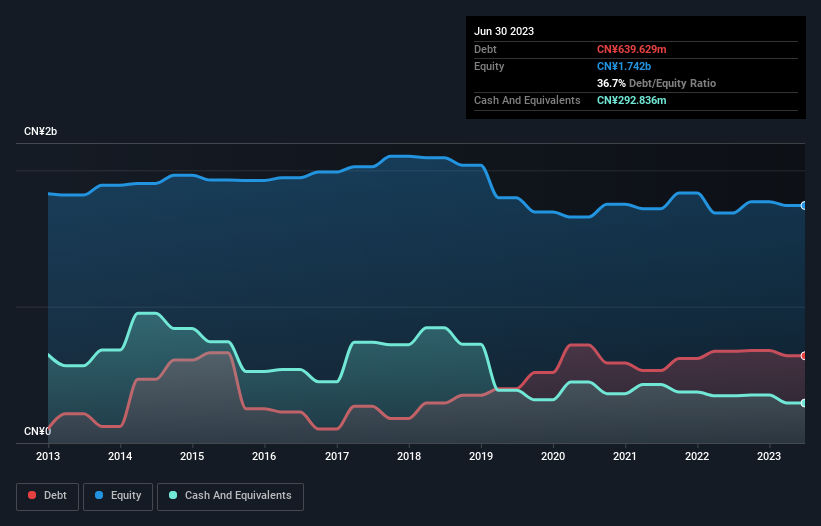Tenfu (Cayman) Holdings (HKG:6868) Has A Pretty Healthy Balance Sheet

The external fund manager backed by Berkshire Hathaway's Charlie Munger, Li Lu, makes no bones about it when he says 'The biggest investment risk is not the volatility of prices, but whether you will suffer a permanent loss of capital.' When we think about how risky a company is, we always like to look at its use of debt, since debt overload can lead to ruin. Importantly, Tenfu (Cayman) Holdings Company Limited (HKG:6868) does carry debt. But the more important question is: how much risk is that debt creating?
When Is Debt Dangerous?
Debt assists a business until the business has trouble paying it off, either with new capital or with free cash flow. Ultimately, if the company can't fulfill its legal obligations to repay debt, shareholders could walk away with nothing. However, a more frequent (but still costly) occurrence is where a company must issue shares at bargain-basement prices, permanently diluting shareholders, just to shore up its balance sheet. By replacing dilution, though, debt can be an extremely good tool for businesses that need capital to invest in growth at high rates of return. The first step when considering a company's debt levels is to consider its cash and debt together.
Check out our latest analysis for Tenfu (Cayman) Holdings
What Is Tenfu (Cayman) Holdings's Debt?
You can click the graphic below for the historical numbers, but it shows that Tenfu (Cayman) Holdings had CN¥639.6m of debt in June 2023, down from CN¥672.7m, one year before. However, it does have CN¥292.8m in cash offsetting this, leading to net debt of about CN¥346.8m.

How Strong Is Tenfu (Cayman) Holdings' Balance Sheet?
We can see from the most recent balance sheet that Tenfu (Cayman) Holdings had liabilities of CN¥1.02b falling due within a year, and liabilities of CN¥262.6m due beyond that. On the other hand, it had cash of CN¥292.8m and CN¥212.0m worth of receivables due within a year. So its liabilities outweigh the sum of its cash and (near-term) receivables by CN¥779.5m.
Of course, Tenfu (Cayman) Holdings has a market capitalization of CN¥4.62b, so these liabilities are probably manageable. But there are sufficient liabilities that we would certainly recommend shareholders continue to monitor the balance sheet, going forward.
In order to size up a company's debt relative to its earnings, we calculate its net debt divided by its earnings before interest, tax, depreciation, and amortization (EBITDA) and its earnings before interest and tax (EBIT) divided by its interest expense (its interest cover). Thus we consider debt relative to earnings both with and without depreciation and amortization expenses.
Tenfu (Cayman) Holdings's net debt is only 0.83 times its EBITDA. And its EBIT easily covers its interest expense, being 12.2 times the size. So we're pretty relaxed about its super-conservative use of debt. On the other hand, Tenfu (Cayman) Holdings's EBIT dived 14%, over the last year. We think hat kind of performance, if repeated frequently, could well lead to difficulties for the stock. When analysing debt levels, the balance sheet is the obvious place to start. But you can't view debt in total isolation; since Tenfu (Cayman) Holdings will need earnings to service that debt. So when considering debt, it's definitely worth looking at the earnings trend. Click here for an interactive snapshot.
Finally, a company can only pay off debt with cold hard cash, not accounting profits. So we always check how much of that EBIT is translated into free cash flow. Over the most recent three years, Tenfu (Cayman) Holdings recorded free cash flow worth 68% of its EBIT, which is around normal, given free cash flow excludes interest and tax. This cold hard cash means it can reduce its debt when it wants to.
Our View
Happily, Tenfu (Cayman) Holdings's impressive interest cover implies it has the upper hand on its debt. But the stark truth is that we are concerned by its EBIT growth rate. Looking at all the aforementioned factors together, it strikes us that Tenfu (Cayman) Holdings can handle its debt fairly comfortably. On the plus side, this leverage can boost shareholder returns, but the potential downside is more risk of loss, so it's worth monitoring the balance sheet. The balance sheet is clearly the area to focus on when you are analysing debt. However, not all investment risk resides within the balance sheet - far from it. Be aware that Tenfu (Cayman) Holdings is showing 2 warning signs in our investment analysis , and 1 of those is concerning...
Of course, if you're the type of investor who prefers buying stocks without the burden of debt, then don't hesitate to discover our exclusive list of net cash growth stocks, today.
Valuation is complex, but we're here to simplify it.
Discover if Tenfu (Cayman) Holdings might be undervalued or overvalued with our detailed analysis, featuring fair value estimates, potential risks, dividends, insider trades, and its financial condition.
Access Free AnalysisHave feedback on this article? Concerned about the content? Get in touch with us directly. Alternatively, email editorial-team (at) simplywallst.com.
This article by Simply Wall St is general in nature. We provide commentary based on historical data and analyst forecasts only using an unbiased methodology and our articles are not intended to be financial advice. It does not constitute a recommendation to buy or sell any stock, and does not take account of your objectives, or your financial situation. We aim to bring you long-term focused analysis driven by fundamental data. Note that our analysis may not factor in the latest price-sensitive company announcements or qualitative material. Simply Wall St has no position in any stocks mentioned.
About SEHK:6868
Tenfu (Cayman) Holdings
Operates as a traditional Chinese tea-product company.
Excellent balance sheet and fair value.


